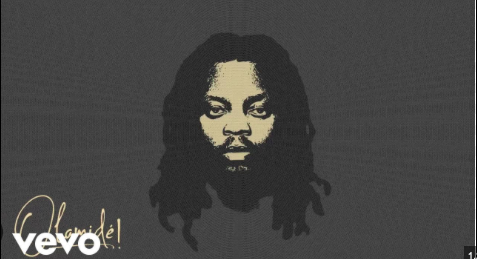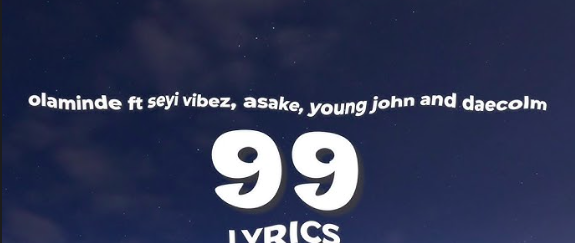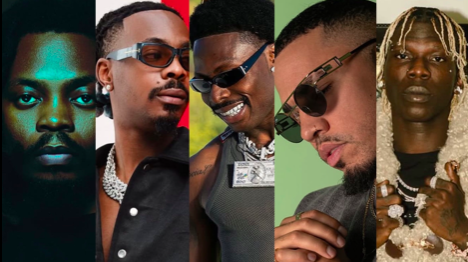The Pulse of Nostalgia and Celebration
“99” opens with a burst of energy that immediately pulls the listener into its celebratory orbit. With the booming ad-lib “Giddem!” and the familiar producer tag “Wi—, Wi—, Wi—, Willis, giddem!” the mood is unmistakable—festive, unapologetic, and rich with Lagos street flair. What follows is a fusion of rhythmic wordplay and cultural inflection that turns this track into more than just a dance record; it becomes an anthem for those craving release from everyday struggles. At its core, “99” is an ode to simpler times, a call to abandon the pressures of adulthood, and an insistence on joy as a form of resistance.
Olamide’s opening verse sets the tone with charismatic swagger. He announces, “To the bank, oh, you know say money, money make her dazzle, oh,” embedding the power of wealth into the fabric of his delivery. Yet, this isn’t just a braggadocious display. There’s a hint of wry observation in his delivery—money, he suggests, is not merely a possession, it is a performance. With the line “And I’m feeling funky, ’cause I made a couple milli’ lowkey,” he showcases his mastery of understatement. The idea of making millions “lowkey” feeds into the quiet power Olamide has built his legacy on—his ability to dominate without always shouting. But he quickly reveals that even that success is not enough: “E no do me, I want more.” This desire is not greed in its vulgar sense; rather, it’s a reflection of the modern hustle—the belief that ambition must be relentless. His question, “Elo lo maje?” which translates to “How much is enough?” followed by “Padi mi kilonso?” (What’s my guy saying?) introduces an intimate, communal element. Olamide isn’t just flexing for himself; he’s in dialogue with his peers, his crew, maybe even the listener. This makes the verse feel like an overheard conversation among close friends who have tasted success but are still hungry for more.
The chorus, delivered by Young Jonn, is the spiritual and emotional anchor of the song. Repeating “Meji, meji” (which means “two, two” in Yoruba), the line serves both as a rhythmic chant and a metaphor for abundance—more than one, a doubling of fun, a doubling of freedom. It may seem simplistic on the surface, but in the repetition lies a form of emphasis that speaks volumes. The phrase “I’m gonna party like ‘99” is drenched in nostalgia. Whether or not the listener experienced that year in the same way, “99” becomes a symbolic era—a time before responsibilities, when fun was unbridled, and life wasn’t weighed down by anxiety. Young Jonn pairs this with the resolve to “Leave all my stressin’ behind tonight,” a simple but powerful declaration. This line does what many modern songs strive for: it connects emotionally without overcomplicating the language. It’s the kind of lyric that listeners shout back at concerts—not because it’s particularly complex, but because it’s relatable and cathartic.
Asake enters the track with his signature melodic style, injecting the second verse with a sense of luxury and escapism. He begins with the line, “All I’m craving is more moolah,” echoing Olamide’s earlier sentiment but with a silkier, more laid-back tone. His verse paints vivid pictures—jets to Paris, dreams of “Love Island,” and a call to his partner not to “dull” him. This last phrase is important in Nigerian street parlance: to “dull” someone is to slow them down, to dim their shine. In other words, Asake is insisting on being met with equal energy, equal passion. There’s a delightful playfulness in the way he says, “Your body got me losing compo’,” likely short for composure. Again, this is a lyric that may not seem deep on paper, but in delivery, it becomes charming and sensuous. His mix of Yoruba, English, and cultural references makes the verse feel both global and local, modern and rooted.
Even his throwaway lines have flair—“Ko dun kopo” loosely translates to “It’s not sweet when it’s scanty.” He’s telling us that abundance—whether in money, love, or good vibes—is the only way to live. His language choice here is purposeful. By pulling in Yoruba phrases, Asake gives authenticity to the imagery, reinforcing the idea that the finer things—though global in appearance—are best enjoyed with a local heart. The recurring call to “more life, more fun” is another chant-worthy moment, tying back to the chorus’s ethos of forgetting stress and choosing joy.
Seyi Vibez’s Edge and the Synergistic Finale
As “99” progresses, Seyi Vibez’s entrance brings a shift that is both complementary and distinctive. His voice, with its raw edge and unmistakable streetwise cadence, adds texture and depth to the track’s layered narrative. The interlude—“Party like ’99, 1942 / Party animal, party / Party like ’99, baby, 1942”—injects a hypnotic, almost trance-like quality that serves as a bridge between the earlier verses and his own contribution. The repeated “1942” references Hennessy 1942, a premium cognac brand synonymous with celebration and luxury in Nigerian and global pop culture. This not only intensifies the party vibe but also situates the song within a lifestyle of sophistication and enjoyment. It’s a subtle but clever way of elevating the track’s atmosphere, suggesting that this isn’t just any party—it’s a high-class, unforgettable experience.
Seyi Vibez’s verse carries a confident bravado that is refreshingly candid. “I give her one time, mm, run it back / Boom, run it back,” he raps, evoking the back-and-forth dynamics of nightlife and romantic encounters. The phrase “Omo ologo,” meaning “famous or glorious child,” taps into street vernacular to convey his self-assuredness and charm. His delivery is rhythmic and percussive, drawing listeners into the moment. The line “When I hit from the back / She go brazy, give me lovin’ right back” is unabashedly explicit but delivered with a playful wink rather than vulgarity. It contributes to the song’s authentic depiction of adult life—messy, passionate, and uninhibited.

Seyi Vibez also establishes his long-standing place in this narrative with “’Cause I move like this, make her do like that / Me I been bad since ’99.” This lyric is both boastful and nostalgic, linking his own persona back to the song’s central theme of 1999 as a golden era. There’s a cyclical symmetry here: the past is not only a time to celebrate but also a personal marker of identity and resilience. By invoking “’99,” he stakes a claim to longevity and relevance in the music scene, suggesting that his style and influence have been “bad”—in the best sense of being impressive or bold—since that era.
The final chorus, harmonized by Young Jonn and Asake, repeats the earlier sentiment but with an added layer of urgency and emotional weight. It reinforces the desire to “party like ’99” and to “leave all my stressin’ behind tonight,” making the refrain not just a catchy hook but a communal anthem for release. The voices intertwine seamlessly, symbolizing the unity among these artists and the shared celebration of culture, success, and freedom.
The Artistic Makeup: Production, Collaboration, and Cultural Resonance
“99” is a masterclass in collaboration. Each artist brings a distinct flavor that blends effortlessly into a cohesive soundscape, a hallmark of Olamide’s ability to curate talent. The production, credited to Young Jonn and Willis, is crisp yet layered. It balances contemporary Afropop beats with subtle nods to late-90s dancehall and hip-hop influences, thereby sonically reinforcing the song’s nostalgic theme. The beat pulses with energy—syncopated drums, melodic synth lines, and a groove that invites movement—reflecting the party atmosphere that the lyrics celebrate.
What makes “99” stand out beyond its infectious rhythm is its lyrical craftsmanship. The song deftly navigates between English, Yoruba, and Nigerian pidgin, demonstrating linguistic dexterity and cultural pride. This multilingual approach is not just aesthetic but strategic, broadening the song’s appeal while maintaining authenticity. The choice to intersperse Yoruba phrases such as “Elo lo maje?” and “Ko dun kopo” grounds the track in Nigerian identity, giving listeners both at home and in the diaspora a sense of belonging.
Furthermore, the song’s theme is universally relatable despite its local color. The yearning to escape stress, to find joy in the moment, and to honor the past resonates across cultures and generations. By anchoring the party motif in “’99,” the artists tap into a collective nostalgia that evokes memories of youth, freedom, and optimism. It is a clever move that allows listeners to project their own meanings onto the song while enjoying its immediate pleasures.

“99” also represents a contemporary Afropop paradigm where storytelling, lifestyle expression, and sonic innovation coexist. The interplay of verses offers a mosaic of perspectives—Olamide’s grounded ambition, Asake’s suave indulgence, and Seyi Vibez’s streetwise confidence—each contributing to the track’s narrative richness. The production does not overpower the vocals but rather supports and elevates them, allowing the lyrics and delivery to shine.
In conclusion, what is your thought? Let us have it. “99” is more than a party anthem; it’s a cultural statement. It invites listeners to celebrate life with intensity and authenticity, to honor the past while embracing the present, and to find unity in diversity. It is a song that is at once deeply rooted and globally minded, marking a high point in the careers of Olamide, Young Jonn, Asake, and Seyi Vibez. The track’s success lies in its ability to balance hedonism with heart, nostalgia with novelty, and individual flair with collaborative synergy.
READ ALSO:DAVIDO A CALL AWAY
Added by


Louiedef
July 3, 2025 at 10:54 pm
проститутки негритянки балашиха проверенные индивидуалки балашиха